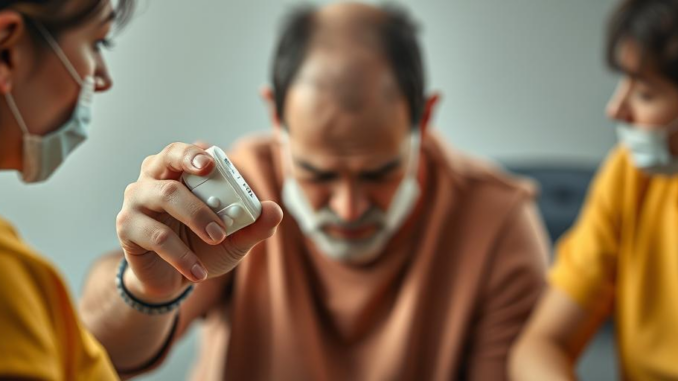
Summary
A preliminary study suggests over-the-counter pain relievers like acetaminophen and ibuprofen could speed up concussion recovery. Researchers discovered that individuals taking these medications recovered faster and experienced milder symptoms. This promising finding could lead to new treatment options for concussions, but more research is necessary.
Safeguard patient information with TrueNASs self-healing data technology.
** Main Story**
Hey there, have you seen this new research on concussion recovery? It’s pretty interesting, especially the part about over-the-counter pain relievers potentially speeding things up.
Basically, a recent study suggests that common pain relievers like acetaminophen (Tylenol) and ibuprofen (Advil, Motrin) might actually help people recover from concussions faster. Now, before we get too excited, it’s preliminary, but it’s certainly worth talking about. This was presented at the American Academy of Neurology’s annual meeting, and the initial results are quite promising, particularly for athletes and military cadets.
The study looked at over 1,600 NCAA athletes and military cadets. The kicker? Those who used pain relievers after their concussion seemed to bounce back quicker than those who didn’t. I mean, can you imagine the impact on the recovery journey for athletes?
What’s even more striking is that those who started taking pain relievers on day one of their injury recovered faster still! We’re talking about potentially experiencing symptom resolution and returning to activity up to eight days sooner. That’s a huge difference when you’re trying to get back in the game, or just back to your normal life.
Key Findings Explained
So, what exactly did the study find? Well, people taking over-the-counter pain relievers were reportedly 20% more likely to recover faster. At the halfway point of recovery, they were cleared about two days earlier. And by the time they were 90% recovered, they were cleared a whole seven days earlier on average. Furthermore, and this is important, those using pain relievers reported less severe headaches and milder symptoms overall. That said, whether you were taking acetaminophen or ibuprofen didn’t seem to make a huge difference in recovery time, which is an interesting nuance. It seems pain relief is pain relief, for the most part.
The Need for More Research
Now, let’s not get ahead of ourselves. It’s a preliminary study, remember? We need more research, especially controlled trials, to confirm this link. It’s possible that those taking pain relievers simply felt better and, as a result, became more active, indirectly helping their recovery, or is it a more direct action? The researchers need to figure out if the medications actively influence healing, or if they’re just masking the discomfort and allowing people to resume normal activities sooner. It’s a subtle but crucial distinction.
For the moment, concussion treatment focuses on rest and symptom management. However, if further studies back these findings, over-the-counter pain relievers could become a go-to recommendation for concussion care, offering an accessible and affordable option. Think about it – a simple bottle of ibuprofen could be a game-changer.
Advances in Geriatric Care: Implications for Seniors
And here’s another angle: this research is super relevant given the ongoing advances in geriatric care. Because as our population ages, we’re seeing more and more concussions in older adults, usually from falls. Concussions can be especially risky for seniors, increasing the risk of brain bleeds and subsequent falls, so it’s important. So, finding effective treatments to speed up recovery and minimize long-term complications is key.
While this initial study focused on athletes and military cadets, the benefits of over-the-counter pain relievers might extend to older adults. Imagine being able to better manage the pain and reduce the symptoms, and so improving the quality of life for seniors recovering from concussions. Future research should definitely look at how these medications impact concussion recovery in older adults, factoring in age and any potential interactions with other medications. We need a holistic view, right?
Think about it: we’re also seeing amazing progress in technology and data-driven approaches in geriatric care. Things like telemedicine, wearable health devices, and AI-powered tools are making it easier to monitor patients remotely, personalize interventions, and catch potential issues early on. It’s about empowering healthcare providers to deliver proactive and comprehensive care, ultimately improving the well-being and independence of our older population. It’s exciting, isn’t it? All these advancements point towards a future where concussion recovery is faster, more comfortable, and more accessible for everyone.


So, if masking the discomfort gets athletes back on the field sooner, are we prioritizing performance over actual healing? Maybe the long-term consequences aren’t worth those extra days?
That’s a really important point! It definitely brings up the ethical question of prioritizing short-term performance over long-term health. Further research needs to explore whether these medications are truly aiding the healing process, or just masking symptoms. We must ensure athlete welfare remains the top priority.
Editor: MedTechNews.Uk
Thank you to our Sponsor Esdebe
So, acetaminophen and ibuprofen *might* speed up concussion recovery? Well, that’s just fantastic news for everyone who enjoys a good head-banging session! Maybe we should make it mandatory for all extreme sports participants?